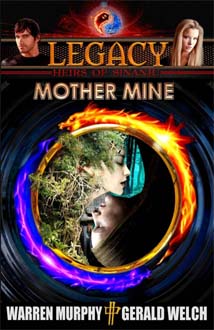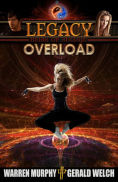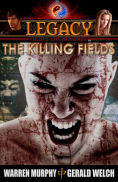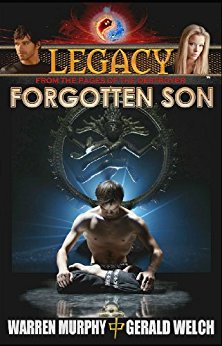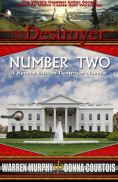 YOU CAN’T TELL A BOOK BY WHAT’S ON ITS COVER… OR MAYBE YOU CAN.
YOU CAN’T TELL A BOOK BY WHAT’S ON ITS COVER… OR MAYBE YOU CAN.
Try this on for size. You’re faced with two books. One is entitled “An Inquiry into the Social Patterns of the Pre-Pubescent in Polynesia.” The other is “Coming of Age in Samoa.”
Or two more books: “Mortality Rates for Law Enforcement Authority Figures in Southern California.” Or behind Curtain Number Two: “To Live and Die in L.A.”
Since all of us are cultured research types, given to smoking pipes and wearing jackets with leather elbow patches, it’s hard to predict which book in each pair we might pick up. But for the general reader, forget it. No contest. Second book every time.
Which brings up the point. When we spend so much time writing a book, why do so many of us then spend twenty seconds on the title, which ─in traditional publishing ─ has been, with the cover art and copy the biggest point of purchase determining factor in whether or not someone might actually pick up and buy the book.
This is like spending your life creating a beautiful sculpture, then putting it in a Hefty bag and tossing it in the town dump at night.
Now different kinds of books take different kinds of titles. That’s obvious. But any book more serious than the pulps should have a theme and the best titles are those that state the theme of the book in an interesting appealing way.
Here are a couple of those ways that might hook a reader:
1) A pre-sold phrase ─ which has a second meaning ─ can be a good title. For instance, “All the King’s Men,” is a great title, maybe my all-time favorite. We all know the nursery rhyme it came from so the phrase rings easily in the ear. It has a second meaning which exactly matches the point and theme of the book ─ after politician Willie Stark’s one-time fall from grace, it was all over for him and no one could put him back together again into the good man he once was.
2) A title which puts a new word or phrase into the vocabulary can be very effective. For instance, Mario Puzo’s “The Godfather” is a great title. Simple, but it put a phrase into the language that all of us have heard now applied to every kind of moron in any kind of moronic endeavor. The Godfather of this, the Godfather of that. Very impressive title.
3) A title that comes from a quotation can often be powerful but the quotation has to be good and to mean something. “For Whom the Bell Tolls” comes to mind. The quote from Donne is “Send not to know for whom the bell tolls. It tolls for thee.” Magical poetical title for a book, and this title paid off on Hemingway’s theme that they were going to die; a good quote can do that. I wrote a book once called “The Ceiling of Hell” based on a quote from Dostoevsky. That was a really good title and it illustrated the theme. Another book I did was called the Red Moon” and that was a stinko title, but don’t blame me. I was stuck with it by the movie producers.
4) A good phrase, whether its a famous quote or not, can be a good title, although they may not have the thematic heft of the great quotations from Shakespeare and the Bible and what all. Looking through an old book catalogue, here is “Strange and Private War” which was a good title. “The Long Way to Die” was a good title. And some titles just have an interesting ring to them: “Softly Came the Dragons.” “Naked Came the Stranger.” The ever-brilliant Dean Koontz, in one of his books on writing, did a hilarious bit on creating titles by mixing up the usual order of words, like those just above.
5) A play on a phrase or word is also good sometimes. “Slay-Ride” or “Where Lawyers Fear to Tread” are titles of two good sellers from the past. But you have to remember that if yours is a serious book, you don’t want too much punning or wordplay on the title because it’ll give readers the wrong idea.
6) Series books can be raised above the pulp level by the quality of the titles. The Travis McGees, written by John D. McDonald, with each one titled by a color are an example…IF the publishers in their sometimes-less-than-infinite wisdom, let you do it. I once wrote a book which I titled “Coming Back for the Smoke.” That’s from a Jersey City political joke about someone who would “rob a hot stove and come back for the smoke.” The publisher changed my title to “Smoked Out” which told me all I needed to know about what the publisher thought of both the book and me. So I left and later the books became my Trace series which, when I got it together, used a string of animal titles that I thought were interesting ─ Pigs get Fat, Too Old a Cat, Getting Up with Fleas etc.
A footnote here. I’m not bitching because my Destroyer series sold fifty million copies. But the fact is that the Destroyers that Dick Sapir and I wrote were sui generis ─ one of a kind. They were politically charged, satires of American society, but because they bore an overriding title like the Destroyer and then a number, they didn’t get taken seriously as books, even though they were used as textbooks in some college sociology classes and occasionally referred as “flights of hilarious satire” by the NY Times and the LA times. That “Destroyer” label tried mightily to kill our reputations as writers, particularly among people who didn’t read the books but who “knew” any book called the Destroyer series had to stink. These are the same people who take the James Bond junk seriously and regard a female character named “Pussy Galore” as the epitome of British authorial sophistication. What crap. Anyway, enough complaining. Moving right along…
7) It’s okay if a title has a feel to it….Robert Ludlum’s old three-word titles were okay because they were part of a series basically and that had a feel: The Scarlatti something, the Matlock something, the Bourne Something. These were okay…better than okay, actually, because they made the books identifiable.
8 ) And of course, scratch all the rules if you’re a household name. Then an author’s name is all the title the book needs and nothing else matters. Stephen King could write a book entitled “Book” and it would sell. And hell, why not? He’s earned it.
Okay. So what’s a bad title? How about things like “Tricks,” “Scorcher,” “Spree”…none of which really say anything. Dick Sapir once wrote a marvelous book which he wanted to call “The Summer of the Twelves,” the twelves being the 12-meter racing boats around Newport where the book took place. The publisher decided to title it “Spies” which Dick thought was an improvement, but it wasn’t. It just didn’t mean anything and it could have been the title of a book for third-grade readers.
The title of Dick’s other books were “Bressio” (awful title;) “The Far Arena” (a grand title); “The Body,” kind of prosaic but with good cover art, carrying a real hint of mystery, and Dick’s last book “Quest,” which was again a pretty prosaic title for such a brilliant work.
Many of us remember the late Bill DeAndrea and besides being a great friend, he was a truly terrific writer but he was the champion of bad titles. Granted we understand the author’s clever idea about Lewis Carroll but a novel title like “Snark” stinks. “Cronus” stinks.
This is the candy bar factor in titles. When I was a kid, I always liked Baby Ruth candy bars but I was embarrassed to go into a store and ask for them. So I rotted my teeth eating Powerhouse candy bars instead. Same thing with books. No one wants to buy a book whose title they don’t understand or that they’re afraid they will mispronounce. No one is more patronizing than a bookstore clerk. Don’t be their victim.
Comb your hair.



